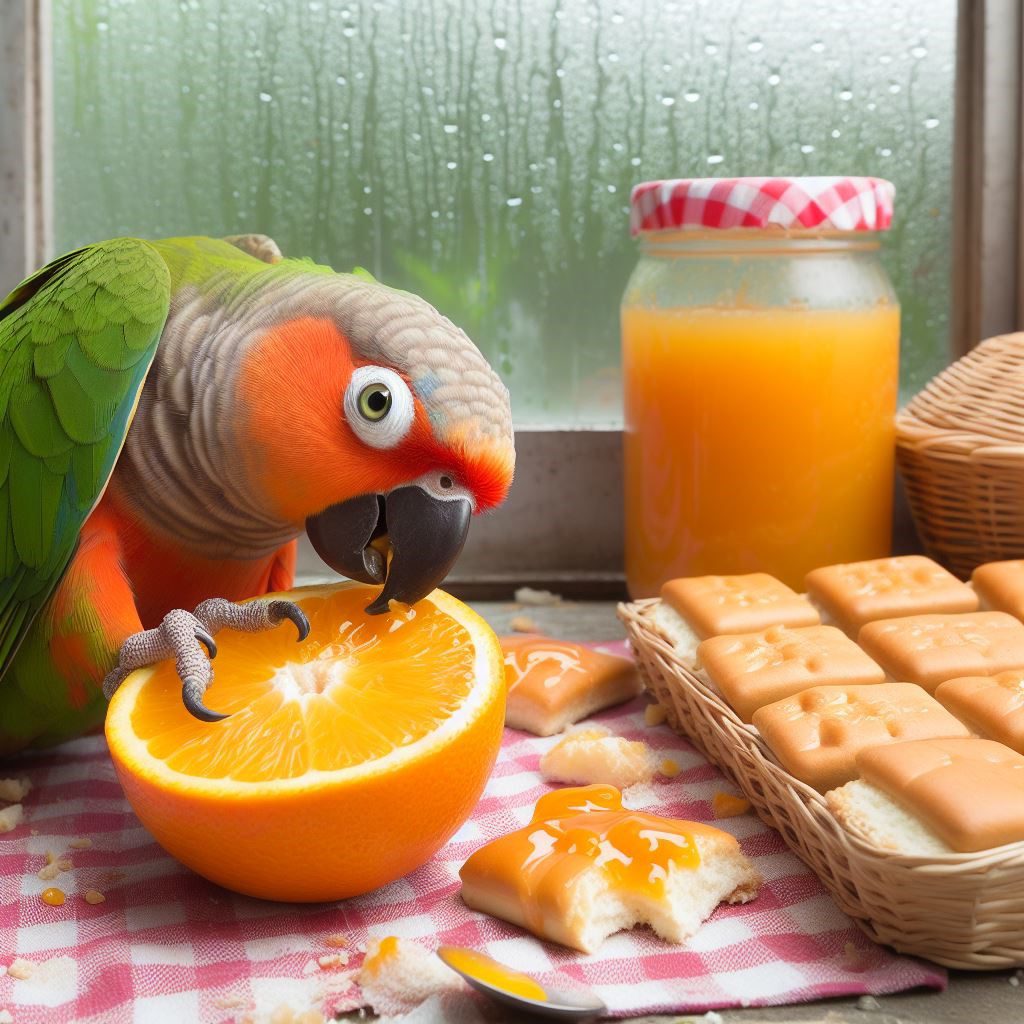Oranges are one of my favorite fruits, I love the wait while peeling them it makes me feel like I’ve earned the delicious snack. Parrots need a diet full of quality vitamins and nutrients that will improve their life and lengthen it. I was peeling myself an orange yesterday and noticed I’d never given my bird an orange before so I decided I’d studied it and put my research into one find-all article. Let’s get into it.

Can parrots eat oranges? Yes, parrots can eat oranges they are a delicious fruit that parrots will love eating, they are completely safe and don’t contain any toxins that will harm your parrot. Oranges are a great source of fiber, vitamin C, folate, calcium, and potassium. However, oranges should not play too big a role in your parrot’s diet as they are high in natural sugars and very acidic which can upset their stomach in large quantities.
In this article, I’ll further explain the advantages of giving your parrot oranges, if they can eat the skin and some other things I think you should be aware of before feeding them to your bird so read on!
Orange Benefits For Parrots
We know oranges are good for our parrots, but just how good are they? Let’s take a closer look at the nutritional content.
One medium-sized orange contains :
| Calories | 60 |
| Protein | 1g |
| Carbs | 15.4g |
| Fat | 0g |
| Sugar | 12g |
| Fiber | 3g |
High In Fiber
In just one orange there are 3 grams of fiber. A nutrient that can largely help your parrot’s digestive system. A high-fiber diet increases the size and softens your parrot’s stools, this leads to better bowel movements and a lower chance of becoming constipated.
Fiber is also great for :
- Improved gut health
- Good for weight loss or weight maintenance
- Can help your parrot live longer
- Lowers cholesterol
- Regulates blood sugar levels
You can also feed your parrot too much fiber which will have negative effects on them like diarrhea so be careful not to overdo it.
Full Of Vitamin C
Oranges are high in vitamin C, a vitamin that acts as an antioxidant to prevent your parrot cells from being damaged. The older your cells are the more prone they become to age-related illnesses like heart disease or cancer. Antioxidants work to slow this down and prevent it.
Other notable health benefits of vitamin C :
- Helps your parrot’s immune system fight off disease
- Lowers cholesterol
- Regulates blood sugar levels
- It’s an anti-inflammatory
- Cleans heavy metals from your parrot’s body
Brussels sprouts, cantaloupe, strawberries, peppers, guava, and peas are also great sources of vitamin C your parrot can have.
Folate
You’ll also find folate inside oranges. It’s a B vitamin and is needed for converting carbohydrates into much-needed energy for your parrot.
Folate is also responsible for :
- Lowering blood pressure
- Eye Health
- Reducing the risk of neurodegenerative diseases
- Creating your parrot DNA and genetic makeup
Foods high in folate include spinach, lentils, edamame, bananas, beets, and broccoli.
Potassium
Potassium is required for the contractions and muscles of your parrot. A bird’s diet lacking in potassium might cause them to grow weak and unwell.
It also has the following features:
- Maintaining a normal heartbeat
- Nerve activity
- Controlling blood pressure
- Aids in the digestion of food
- Maintains a healthy fluid balance.
Spinach, watermelon, edamame, apricots, beets, and pomegranate are all good sources of potassium.
Calcium
Calcium is essential for a variety of functions in your parrot’s body, including the health of parrot eggs, which are made up of approximately 97 percent calcium.
It also helps with a variety of other tasks, such as:
- The skeletal structure’s ability to operate
- Muscle mobility is encouraged.
- Blood clotting and fat metabolism
- Nerve impulses
- Hormone production
Seeds, lentils, almonds, spinach, and kale are also good sources of calcium for your parrot.
How You Should Feed Oranges To Your Parrot
The most common way to give oranges to your parrot is to peel them pick out each slice and feed them individually to your parrot. You shouldn’t give your parrot a whole orange as it’s going to be too much sugar and carbs for them to handle.
A few slices a couple times of week is the optimal amount of orange where they will receive all of its health benefits but none of the downsides like too much sugar.
Are There Any Risks To Feeding Your Parrot Oranges?
The good news is oranges themselves contain no immediate toxins that are life-threatening to your parrot however there are a few concerns you should be aware of.
- High in sugars :
Oranges, like most fruits, contain a high amount of natural sugars. In just one orange there’s around 12 grams of sugar. While sugar itself isn’t toxic to parrots it certainly won’t do them any favors health-wise.
Too much sugar in your parrot’s diet can lead to various health conditions along with obesity, increased blood pressure, and cancer.
- Very Acidic :
Oranges, similar to other citrus fruits like grapefruit and lemons, are highly acidic. Your parrot’s stomach acid helps them break down their food to be digested however when they have oranges a larger amount of acid is produced.
This can lead to things like abdominal pain, heartburn, and nausea.
Too much acidity in your bird’s diet can also disturb their pH balance and stop them from absorbing much-needed nutrients.
Can Parrots Eat Orange Peels? (Skin + Rind)
As humans we don’t really prefer to eat the skin of many fruits as the flesh is delicious enough, but what about parrots? Parrots can eat the peel of an orange, it’s safe for them to do so and the skin actually holds some nutrients your bird can benefit from.
However, there’s a good chance the skin has been coated in chemicals such as pesticides to keep away pests while the fruit is being harvested. This could harm your parrot so if you are going to give them the peel be sure to wash it.
The orange peel can also be hard to digest so only give them small pieces.
Can Parrots Have Orange Juice?
Fruit juice is a popular way for parrot owners to give their birds some nutrition and a healthy juice all in one. Parrots can have orange juice if you make it for them using fresh oranges and squeeze it up for them, this way you know what is going on in it and that it’s safe for them.
You should avoid buying store-bought orange juice for your parrots as they have even higher amounts of sugar, along with additional preservatives and additives that are only used for flavoring and provide no health benefit. If you are going to buy orange juice already made, opt for a no-added-sugar one.
Remember oranges are very high in sugar so don’t go too crazy with your serving.
What Other Foods Can Your Parrot Eat?
You know oranges are safe for your parrot to eat but if you’re like me then you’re always looking for new foods to improve your parrot’s diet to create some variety and include vital things that aren’t already in your bird’s diet.
So what other foods can your parrot eat?
- Fruit & Vegetables
Foods like asparagus, broccoli, carrots, peppers, bananas, blueberries, and pineapples are all fine and encouraged for your parrot to eat.
- Nuts
Things like almonds, Brazil nuts, cashews, hazelnuts, pistachios, and walnuts can be fed to your parrot. Just be wary of the fat content in some of them so they may need to be treated as a snack for your parrot. We don’t want them getting fat!
Oranges For Parrots – Final Thoughts
When given in moderation oranges can be a very nutritious fruit they can enjoy. Fruits should make up around 10% of your parrots diet however make sure to vary the kind of fruit and not just rely on oranges for vitamins and nutrients.
I hope you found this post useful and your parrot enjoys a delicious new addition to his or her diet!






